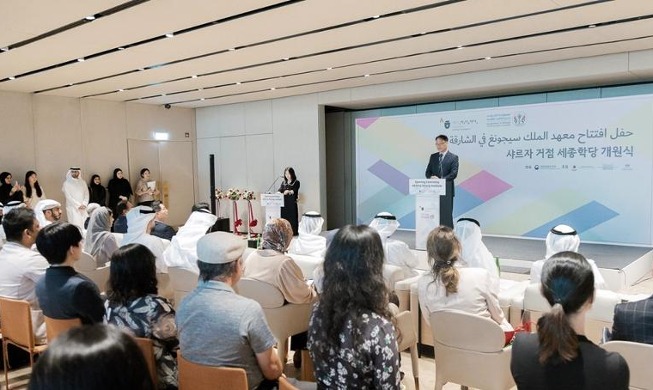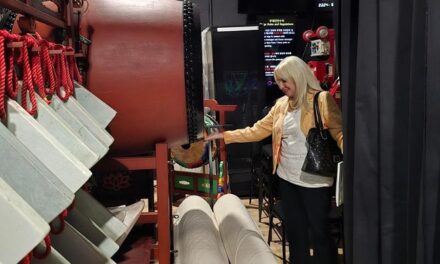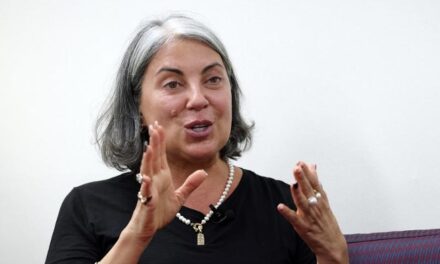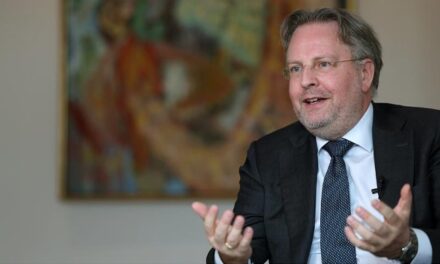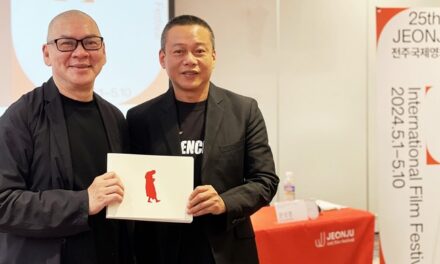Oh Joowon, director of the newly opened King Sejong Institute Center in Sharjah, the United Arab Emirates, on April 24 gives a congratulatory speech at the center’s opening ceremony held at the public library House of Wisdom in the UAE city.
By Israa Mohamed
Photos = King Sejong Institute Center in Sharjah, UAE
“The United Arab Emirates (UAE) has three branches of King Sejong Institute, but demand for Korean-language education in Sharjah keeps rising. When locals sometimes greet me in Korean while I’m walking on the street, I’m both really surprised and happy to see them.”
Oh Joowon, director of King Sejong Institute Center (KSIC) in Sharjah, said this at the facility’s opening ceremony last month. The favorable attitude in the Mideast toward the Korean language and culture has fueled rising demand for expansion of relevant infrastructure.
Thus Sharjah, the so-called capital of Arab culture, was chosen as the location of the latest KSIC as the Middle Eastern base.
As the first facility of its kind in the Middle East, KSIC in Sharjah held its opening ceremony on April 24 at the public library House of Wisdom. Its opening is expected to jumpstart demand for both the Korean language and culture in the Middle East and Africa.
The center holds classes at the University of Sharjah under a tie-up with the school.
The following are excerpts from Korea.net’s written interview held in parts from April 2-29 with KSIC Director Oh Joowon.
How is demand for Korean-language education in the UAE?
King Sejong Institute in the UAE was launched in 2019 with 382 students, a number that rose to 565 last year. The trend over the past five years is steady growth in the number of students. Demand for Korean-language education in Sharjah, the center of UAE culture and education, has existed for a long time.
I feel the high popularity of Korean language here. Seventy-five students registered in a day after we announced the launch of this year’s first special introductory course. Right now, only students at the University of Sharjah can take the course. But we plan to gradually expand eligibility to the UAE public so that more of them can access Korean language and culture.
You assumed your post three months ago. How do Sharjah residents see Korea?
I think that the locals feel the appeal of Korean sentiment mainly through K-pop and K-dramas. When I walk the streets in Sharjah, I sometimes get greeted or spoken to by locals in Korean. When I ask them how they learned Korean, all of them say they learned by watching Korean dramas.
Korean dramas are always in the top 10 rankings of Netflix UAE. A Korean beauty course at our institute’s Dubai branch is so popular that more students take it than any other course.
Very few Koreans live in Sharjah. But if you go to nearby markets or regular hypermarkets, you can easily find Korean groceries sold in Korea such as ramyeon (instant noodles). What’s most surprising is seeing University of Sharjah students holding cup ramyeon such as Buldak Bokkeum Myun (a brand of spicy chicken-flavored and stir-fried noodles) in their arms.
After my appointment here, I brought with me Korean food ingredients such as gochujang (red chili paste), doenjang (fermented soybean paste) and myeolchi aekjeot (salted anchovy extract). But when I saw a supermarket selling the same ingredients near my home, I was both surprised and regretful that my efforts were in vain.
Leading staff from the public library House of Wisdom and King Sejong Institute Center (KSIC) in Sharjah, the United Arab Emirates, on April 24 take a commemorative photo before the ribbon-cutting ceremony to officially open KSIC.
What is your plan this year for spreading Korean–language education in Sharjah?
Because we just started, our goal this year is to stably establish the center. For this, we’ve launched four introductory courses in Korean and are holding a special two-week course. From the second half of the year, we will start a regular curriculum that fully applies our institute’s standard curriculum. We will provide quality opportunities in Korean-language education in various ways like hiring outstanding instructors from Korea and training their counterparts here.
At the same time, we will assess on-site demand to devise and run programs to help Korean-language students in the Sharjah area learn Korean through various ways by using special courses for specific objectives such as Korea-Arabic interpretation and translation, business, employment and tourism.
What cultural programs other than Korean-language education will your center pursue?
Above all, we run programs that introduce Korean culture, lifestyle and society. In addition, we will soon hold a joint Hanji (traditional paper) crafts workshop and screenings of Korean movies. In the second half of the year, we plan to utilize Sejong Academy to launch an interactive course featuring trying on Hanbok (traditional clothes) and learning traditional calligraphy. We plan to collaborate with our institute’s branches in Abu Dhabi, Dubai and Ajman to hold a diversity of culture events.
As the Middle East’s first KSIC, how will you support your institute’s branches?
Demand for Korean-language education and culture is quite high in the Middle East, something true when compared to that in the Americas and Europe. This is reflected by the applicant-to-space rate of 5:1 over the past three years to take Korean-language courses at our institute housed within the Korean Cultural Center in Egypt.
About 20,000 people attended last year’s KCON, the world’s largest festival of Korean culture, in Saudi Arabia and enjoyed K-pop, Korean drama, food and beauty. In the UAE, 93.8% of the people are aware of Korea according to a study by the Korean Foundation for International Cultural Exchange.
KSIC in Sharjah is the base for spreading Korean language and culture in the Middle East and Arab regions. Based on sufficient understanding of and agreement with Arab culture, systems and customs, we will run 14 branches of our institute in 11 Middle Eastern countries. We will cooperate with partner organizations, academia and business to find new project models customized for demand for Korean language and culture.
Any concluding message for Korea.net readers?
KSIC in Sharjah will do its best to assist students in the Middle East including the UAE access Korean language and culture in easier and more fun ways. We ask for your interest and support.
ess8@korea.kr

